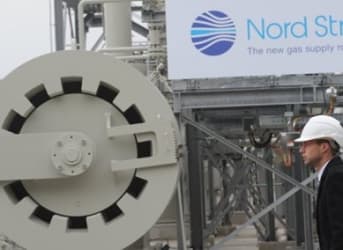There is a growing chorus in Europe against Germany’s support to expand a major natural gas pipeline from Russia over fears that it will leave Europe more dependent on their eastern neighbor.
The Nord Stream 2 would build on the existing Nord Stream pipeline, a conduit that delivers Russian natural gas to Germany via the Baltic Sea. Crucially, the project cuts out Ukraine, a key strategic objective for Russia since the original project’s inception.
The latest $11 billion expansion would double the pipeline’s current capacity of 55 billion cubic meters of gas per year. From Russia’s perspective, the project will increase market share and gas sales; from Germany’s point of view, the project increases sources of supply. Nord Stream 2 was originally conceived of years ago, but in June 2015 Gazprom signed a memorandum with Royal Dutch Shell and OMV to move forward.
However, Germany came under renewed and heightened criticism last week at a summit of European Union leaders in Brussels. Germany’s Economy Minister Sigmar Gabriel had previously vowed to prevent “political meddling” from bogging the project down. Related: The Golden Age Of Coal In China Is Over
But the project is nothing if not political, as most gas pipelines in Europe are, and opposition from leaders in Eastern and Central Europe appears to be growing. Seven European countries sent a letter to the European Commission in November, voicing their angst about the Nord Stream 2 because they believe the expansion will increase dependence on Russia at a time when the EU has pledged to do the opposite. “We want to be heard and we hope this message will be taken on, especially by the chancellor,” a Slovak diplomat said on December 16, according to The Wall Street Journal, referring to German Chancellor Angela Merkel.
Also, many in Europe argue the expansion will drastically cut gas flows through Ukraine, which could undermine the economy by taking away the lucrative transfer fees that Kiev receives. Obviously, to Russia, that is a feature of the project, not a drawback. But since the crisis in Ukraine began in 2014, the EU has sought to diversify away from Russian energy and also help prop up a crippled Ukrainian economy. Opponents of the project argue that Nord Stream 2 would undermine both of these objectives, leaving Europe more dependent on Russia and leading to the economic strangulation of Ukraine. “Nord Stream 2 is our greatest concern as of today,” Ukrainian President Petro Poroshenko said in Brussels last week.
The U.S. State Department lent its voice to the opposition as well. “All I see is an overarching political agenda to get rid of Ukraine as a transit country at all cost, no matter what the financial cost is,” Amos Hochstein, the U.S. special envoy for international energy affairs, told the WSJ. Related: 7 Reasons Why Oil Could Fall Even Lower Before Christmas
Nord Stream 2 also has increasingly worried European officials. The EU’s Energy and Climate Minister Miguel Arias Cañete told the WSJ that the EU’s projected energy demand for the next several decades won’t be large enough to justify the huge pipeline expansion. Indeed, Europe’s natural gas demand is not exactly growing briskly, with energy efficiency, rising levels of renewable energy, and a stagnant economy all combining to keep gas consumption relatively flat. In that context, the business case for the pipeline is debatable.
On December 18, Donald Tusk, European Council President and former Prime Minister of Poland, threw his weight against the Nord Stream expansion. “In my perspective, Nord Stream does not help diversification, nor would it reduce our energy dependence,” Tusk said at the summit in Brussels.
Italian Prime Minister Matteo Renzi argued that Nord Stream 2 must meet the same standards that were applied to the now defunct South Stream pipeline proposal under the Third Energy Package, a set of policies passed by the EU to encourage energy security and diversity of supply. The South Stream pipeline, also pushed by Russia, would have supplied Southern Europe with natural gas. Last year, the EU put enough pressure on South Stream to kill it off, fearing too much control by Gazprom over European energy supplies. Renzi is put off by the fact that Germany has now turned around and supported Nord Stream 2, which will result in a similar outcome, a move that many view as hypocritical. Related: Don’t Expect An Exodus Of Crude Now The Export Ban Is Lifted
German Chancellor Angela Merkel, finally put on the spot, defended the project as one of economics, not politics. “I have made clear, along with others, that this is first of all an economic project. There are private investors for this project,” Merkel said on December 18. At issue is whether or not common EU energy security policy should apply, or whether the project is merely one that affects national policy within Germany. Germany’s Economy Minister insists that if the project moves forward, it will comply with EU law. And in a nod to competition rules that forbid Gazprom from owning both the natural gas and a majority stake in the project, Gazprom reduced its stake in Nord Stream 2 in November from 51 to 50 percent.
Nevertheless, Nord Stream 2 still faces several large obstacles, not the least of which is questionable economics. Moreover, despite the statements from top Germany officials that the project should not be the subject of politics, the swelling political opposition within Europe could yet block Nord Stream 2 from getting off the ground.
By Nick Cunningham of Oilprice.com
More Top Reads From Oilprice.com:
- Just About Every Part of the Permian Basin is Unprofitable at $30 Per Barrel
- Will Goldman Be Right After All?
- OPEC Members In Jeopardy, How Long Can They Hold Out?


















